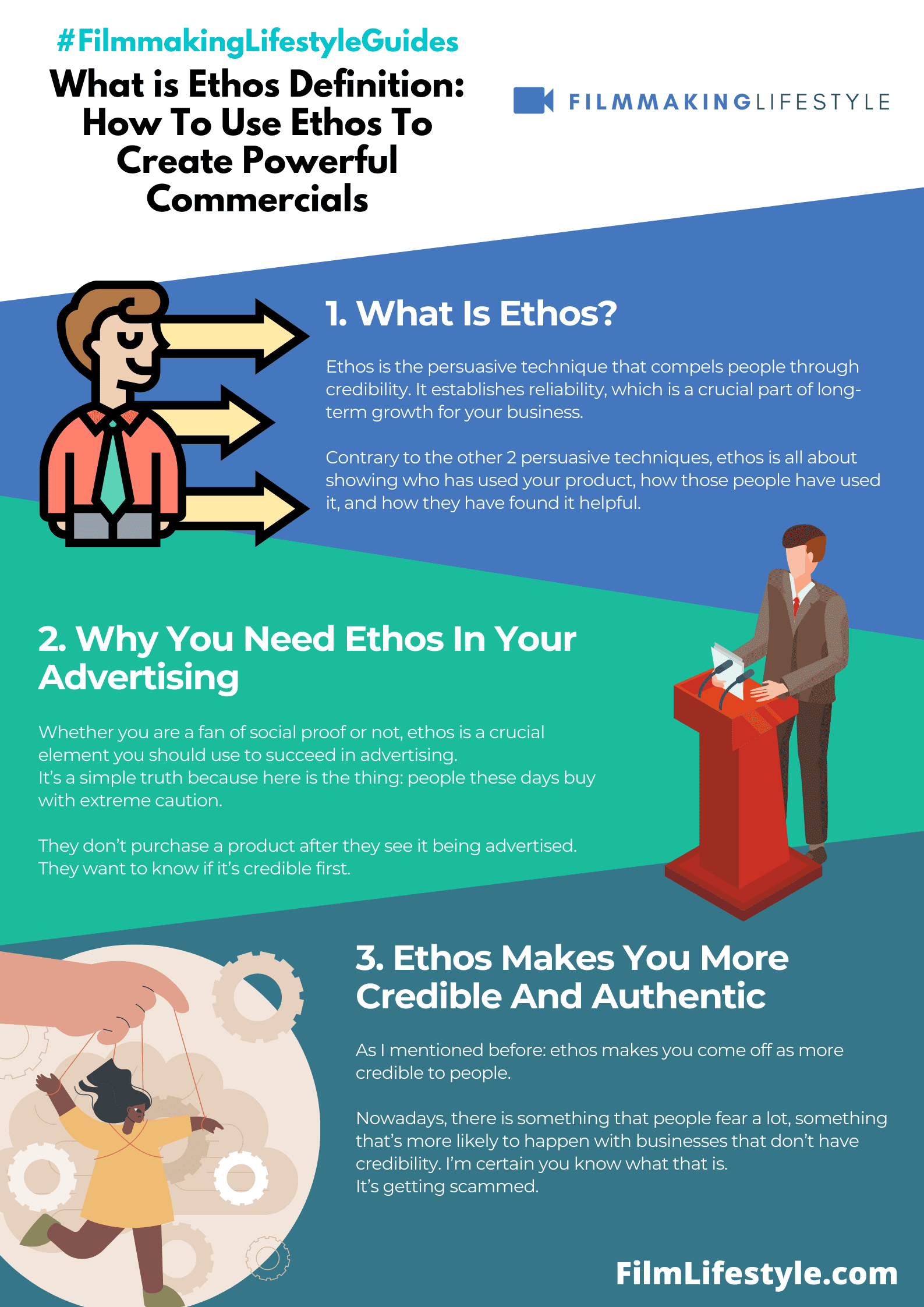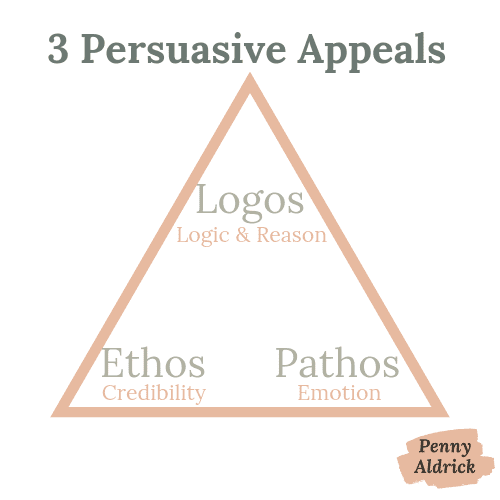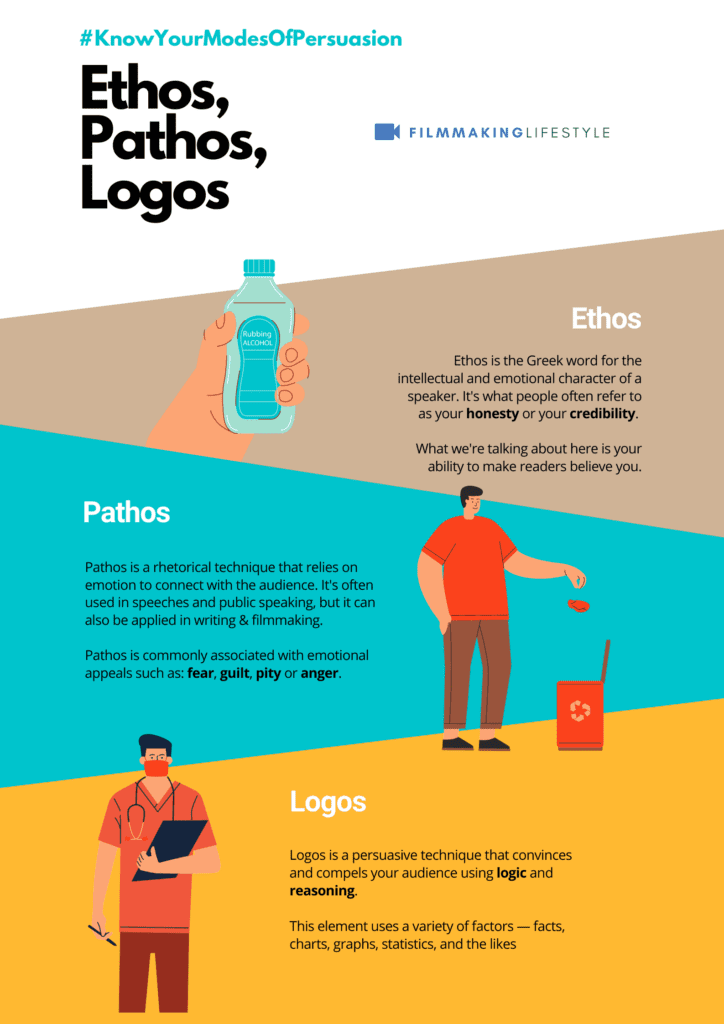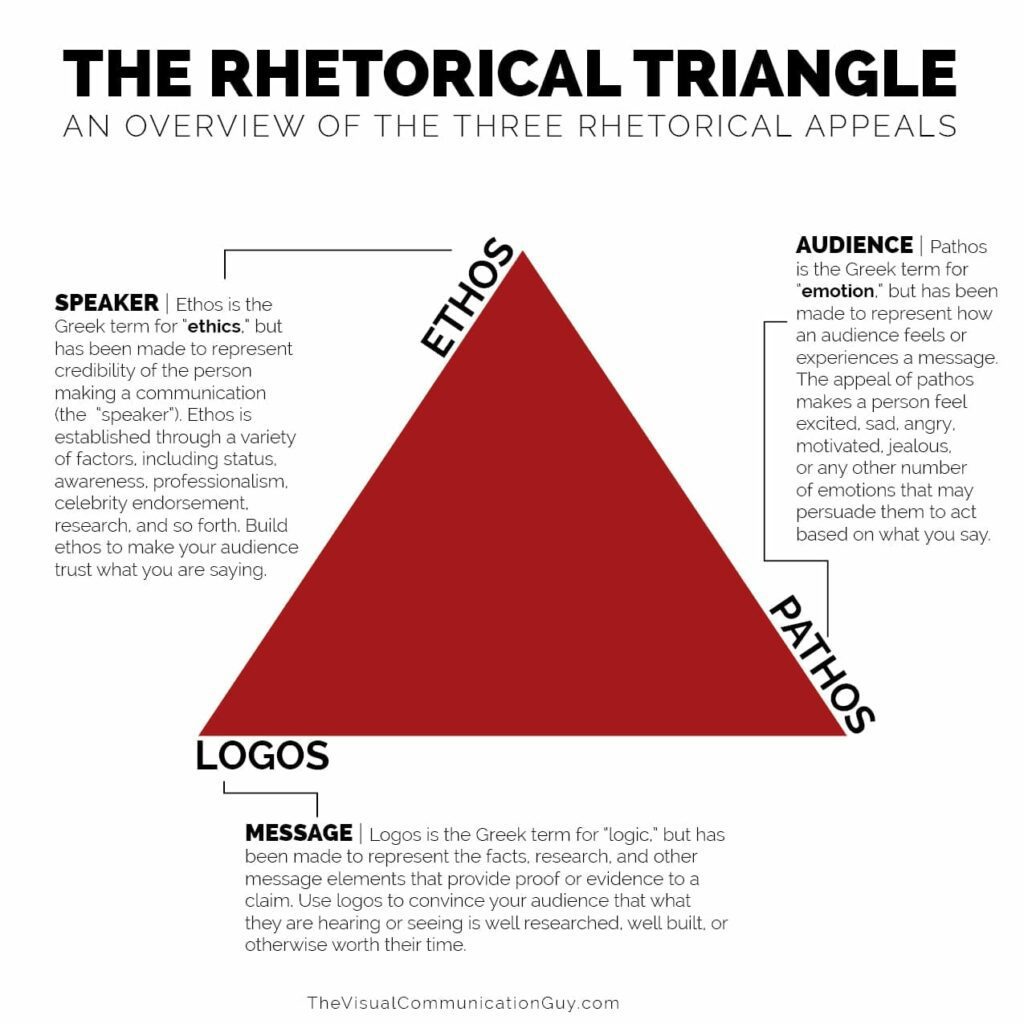You’ve got a product you want to sell. Or a reasonable argument you want to convey to your audience. Or even an idea you want to get across to people through a speech. You need to leverage the power of Ethos.
Everything seems good, except you don’t know how to get your point or offer across without looking suspicious.
You are stuck — you can’t get your appeal or message out to an audience. And even if they see it, they are too hesitant to act, or at the very least, hear what you have to say.
Do you know why that is?
Ethos – Introduction
Here’s the problem: you lack credibility, my friend. You are new to an audience and they don’t yet know you.
You lack authenticity. How can they trust you when you haven’t proven your reliability yet.
This might sound like a modern conundrum, but even so, it has already been addressed by the ancient Greek philosopher, Aristotle.
He discovered the three modes of persuasion: pathos, ethos, and logos, and out of them, Ethos is the one that solves the issue we’re discussing here.
It helps you come off as credible to your audience, and most importantly, you won’t look ‘scammy.’
Who would want to look scammy anyway?
Here’s our breakdown of ethos, pathos, logos and what each one means:
In this article, I’m going to tell you all you need to know about Ethos. In the end, you will have in-depth knowledge of the concept.
Not only that, but you will also have a firm grasp of the technique, which will help you use it without much hassle.
What Is Ethos?
Ethos is the persuasive technique that compels people through credibility. It establishes reliability, which is a crucial part of long-term growth for your business.
Contrary to the other 2 persuasive techniques, ethos is all about showing who has used your product, how those people have used it, and how they have found it helpful.
People are more likely to trust other people as personal recommendations, whether it’s from a close friend or a public figure in your ad.
That’s all ethos is about: gain credibility by proving you are reliable and honest. Only then will you increase your persuasion with this strategy.
ETHOS DEFINITION
What Is Ethos?
Ethos is a Greek word that can be used to describe the character of a person or an idea and is used prominently in the world of brand commercials and advertising.
Ethos is important for persuasion because it builds trust and credibility in what someone says.
When someone talks about their personal story, they are using their own ethos to persuade people that they know what they are talking about.
Even if someone’s credentials aren’t impressive when people tell their story with conviction and passion it will build more credibility than any education or title could ever do alone.
Ethos is the cornerstone of persuasion, a tool to establish credibility and authority when presenting an argument or idea.
It’s about convincing your audience that you’re trustworthy and ethical.
We’ll explore how to harness the power of ethos effectively, ensuring your message isn’t just heard, but also respected and acted upon.
Stick with us to learn the strategies to build a strong ethos that can make all the difference in your communication.
The Importance Of Ethos In Persuasion
Ethos plays a crucial role in the art of persuasion.
It’s the defining element that establishes trustworthiness and credibility among audiences.
In the filmmaking world, ethos is essential.
Directors and screenwriters must create believable narratives that audiences can trust, much like a speaker weaving a compelling argument.
Strong ethos can sway viewers’ opinions and evoke emotional responses.
Consider To Kill a Mockingbird – the authority of the character Atticus Finch enhances the film’s persuasive impact.
Our ethos reflects in the authenticity of our storytelling.
It’s what separates amateur work from pieces that resonate profoundly with audiences.
We base the success of a film on the connection it establishes.
Persuasion is central to this process, prompting viewers to accept the presented viewpoint.
Ethos is built through various means:
- Demonstrating expertise and knowledge,
- Showcasing past successes and accolades,
- Displaying honesty and integrity through narrative choices.
Ethos isn’t static.
We must continuously cultivate it, ensuring each project aligns with our established standards.
Connecting ethos to the heart of a story taps into the power of persuasion.
This approach can turn a simple film into a timeless classic.
Persuasive communication isn’t solely about what’s being said.
It’s about who’s saying it and how it’s being presented.
We recognize that without ethos, our message may fall flat.
It’s the foundation upon which we build the trust that carries our vision to the audience.
Filmmaking is a form of communication.
So, ethos becomes as crucial as any camera technique or editing style in our creative arsenal.
What Is Ethos?
Ethos is the cornerstone of trust and credibility in persuasion.
It’s derived from the Greek word meaning “character,” and it represents the ethical appeal or the persuasive power of the author’s or speaker’s credibility.
In the realm of filmmaking, ethos isn’t just about the director’s reputation; it involves every layer of the storytelling process.
It’s the collective persona the film adopts to appeal to its audience, woven into the script, direction, and even the production values.
To harness the power of ethos effectively, we must be acutely aware of the impression we’re making on our audience.
This involves a strategic blend of:
- Showcasing expertise and authority,
- Demonstrating ethical behavior,
- Establishing a strong personal connection with the audience.
By integrating these elements into our films, we enhance our narrative’s authenticity and make a compelling case for our audience to invest their trust—and their time—in the stories we tell.
Goodfellas, for instance, solidifies Martin Scorsese’s ethos by marrying his expertise in storytelling with his familiarity with the crime genre, delivering an experience that’s both authentic and captivating.
Creating a robust ethos requires diligent attention to detail.
This means ensuring that every aspect of the film aligns with the ethical and moral standards the audience expects.
Conflicts and characters should reflect a sense of realism that resonates with viewers on a deeper level.
When the narrative decisions align with these principles, the persuasive impact is magnified, making it easier to engage and retain the audience’s attention.
Take To Kill a Mockingbird – the ethos here is unmistakably shaped by the strong moral compass of the characters, particularly Atticus Finch.
The film’s appeal to authority and virtue dramatically enhances its persuasive power.
We see firsthand how an unwavering commitment to integrity can transform a simple narrative into a powerful and timeless story.
Ensuring that the ethos remains consistent throughout the filmmaking process is a challenge that requires an unyielding focus on personal and narrative integrity.
For us, this means being authentic in our storytelling and true to our artistic vision.
Whether it’s through meticulous research or crafting characters that resonate with real-world issues, we continually strive to build and maintain the ethos that is crucial for effective persuasion.
Establishing Credibility And Authority
Ethos serves as a critical tool in filmmaking, anchoring the narrative in a foundation of trustworthiness and respect.
It’s about convincing the audience of our integrity as creators and the weight of our message.
To do this, we must first establish credibility and authority, both of which hinge on various factors within the production process.
We understand that credibility stems not only from our own reputation but also from the expertise we display through our craft.
Authority, on the other hand, is earned by demonstrating knowledge and a command over the subject matter and technical aspects of filmmaking.
The key components that contribute to establishing credibility and authority include –
- Quality of the screenplay – A compelling and well-researched script lays the groundwork.
- Expertise of the director – The director’s vision and decision-making prowess influence the film’s ethos profoundly.
- Choice of cast and crew – Skilled actors and a proficient team reflect our commitment to excellence.
- Authenticity in storytelling – Honesty in the narrative enhances our ethical appeal.
- Technical finesse – Mastery over film techniques and technologies underscores our authority.
A robust ethos isn’t accidental.
It’s deliberately crafted by decisions that convey our professional standards.
Films like Schindler’s List and Spotlight exemplify the power of a filmmaker’s credibility and authority, where every element within the film serves to reinforce the ethos.
We meticulously select the elements that build our credibility, knowing that our audience’s trust is
With every frame and line of dialogue, we aim to project a confident and authoritative voice that resonates with our viewers.
Authority is also about being consistent.
We can’t afford to have discrepancies between what we present on screen and what we represent in reality.
Consistency in our message, style, and ethics solidifies our standing as trustworthy storytellers.
Our responsibility to maintain credibility and authority is not just towards our audience but to ourselves as well.
It’s a commitment to uphold the integrity of the filmmaking process, ensuring that when our work speaks, it does so with an authentic and credible voice.
By doing so, we sustain the ethos that is the hallmark of compelling cinema.
Building Trustworthiness And Ethics
Trust is a cornerstone of ethos in film making.
We recognize that viewers must believe in the integrity of the characters and the narrative to fully engage with the story.
Ethics go hand-in-hand with trustworthiness.
Audiences expect filmmakers to handle sensitive subject matter with respect and accuracy.
Trust can be built through:
- Consistency in the characters’ actions and development – Authenticity in the narrative’s alignment with real-world experiences – Transparency about the creative process and decisions.
To uphold ethics, filmmakers are bound to:
- Respect cultural and social differences – Avoid misrepresentation of facts or history – Ensure that all aspects of the production adhere to ethical standards.
Our authority on the subject stems from our dedication to maintaining these standards.
Building a film or documentary that resonates with viewers often hinges upon how well trust and ethics are woven into the fabric of the project.
Following ethical guidelines isn’t just about avoiding controversy.
It’s about establishing a legacy of trustworthy content that audiences can consistently turn to.

Technical mastery alone won’t foster trust.
It’s the ethical lens through which we tell stories that eventually shapes the ethos of our work.
By prioritizing these ethical considerations, we aim to create content that not only entertains but also upholds the values that are important to us and our audience.
Strategies To Harness The Power Of Ethos
When tapping into the power of ethos, there are strategic approaches we can employ to cement our credibility and moral standing with our audience.
One approach is consistency – maintaining a steady vision and message throughout a project goes a long way in establishing trust.
This means that from the script to the screen, our narrative and characters need to resonate with unwavering authenticity.
Transparency within the creative process can also fortify our ethical appeal.
When we’re open about our decision-making, we give our audience a glimpse into the integrity that guides our craft.
Fostering relationships with reputable figures in the film industry can provide an instant boost to our ethos.
Collaborating with well-respected directors, actors, and producers allows their credibility to reflect upon our work.
We recognize the importance of demonstrating expertise in every frame.
It’s not only about what we show but how we show it:
- Mastery over cinematography and sound design – Depth in character development – Sophisticated plot structures.
By illustrating our knowledge and proficiency, we assure our audience that they’re in the hands of a filmmaker who knows the art and science of cinema inside out.
Ethical and moral considerations must permeate our work.
It is imperative that we align our films with our values and maintain an ethical compass that guides our storytelling and production decisions.
eventually, the essence of ethos in our projects isn’t something that’s tagged on as an afterthought.
It’s embedded in the DNA of our creative expression, ensuring every aspect of our films upholds the standards we set for ourselves and meets the expectations of our audiences.
What Is Ethos And How Do You Use It – Wrap Up
Harnessing ethos effectively elevates a film’s impact, resonating with audiences on a deeper level.
We’ve seen how building credibility, maintaining ethical standards, and forming a personal bond with viewers can transform the storytelling experience.
By integrating these elements, filmmakers not only earn trust but also enhance the authenticity of their narrative.
Remember, it’s the meticulous attention to ethical details that often sets memorable films apart.
Let’s carry these insights forward, ensuring our future projects are not only seen but also felt, leaving a lasting impression that echoes beyond the screen.
Frequently Asked Questions
What Is Ethos In Filmmaking?
Ethos in filmmaking refers to the ethical appeal, which is the persuasive power stemming from the filmmaker’s credibility and character.
This involves showcasing expertise, demonstrating ethical behavior, and establishing a connection with the audience.
Why Is Ethos Important In Persuasion?
Ethos is a key component of persuasion because it builds trust and authority, which are essential for convincing an audience of the filmmaker’s message.
A strong ethos can enhance the authenticity and persuasive impact of the narrative.
How Can Filmmakers Establish A Strong Ethos?
Filmmakers can establish a strong ethos by consistently conveying their vision, being transparent about their creative process, collaborating with reputable figures, and showing expertise in filmmaking.
They must ensure each aspect of the film is ethically-aligned.
Can You Give Examples Of Films That Successfully Use Ethos?
Examples of films that effectively incorporate ethos include “Goodfellas,” which leverages the director’s reputation, and “To Kill a Mockingbird,” which aligns the storytelling with strong moral standards.
What Strategic Approaches Can Filmmakers Take To Harness The Power Of Ethos?
Filmmakers can utilize strategies such as maintaining vision consistency, message clarity, engaging in transparent creative practices, collaborating with figures holding strong reputations, and demonstrating expertise in all filmmaking aspects.







